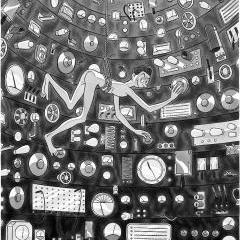The Perfectionists: How Precision Engineers Created the Modern World
DeTnk Bookshelf
Scientists and engineers recognize an elusive but profound difference between precision and accuracy. The two qualities often go hand in hand, of course, but precision involves an ideal of meticulousness and consistency, while accuracy implies real-world truth.
When a sharpshooter fires at a target, if the bullets strike close together—clustered, rather than spread out—that is precise shooting. But the shots are only accurate if they hit the bull’s eye. A clock is precise when it marks the seconds exactly and unvaryingly but may still be inaccurate if it shows the wrong time. Perversely, we sometimes value precision at the expense of accuracy.
Simon Winchester, whose The Perfectionists ventures a history of this abstract concept, offers another way of looking at the distinction: a Rolls-Royce automobile, the 1984 Camargue model. In the course of a story filled with wonderful machines of every type, Winchester reveals himself to be something of a Rolls-Royce fanboy, but he declares this one to have been an ugly behemoth:
While the engineers had lovingly made yet another model of a car that enjoyed great precision in every aspect of its manufacture, those who had commissioned and designed and marketed and sold it had no feel for the accuracy of their decisions.
Winchester is a longtime journalist turned author, a meticulous researcher and catholic thinker who has written superb books about The Oxford English Dictionary, the Krakatoa eruption, the birth of modern geology, and (separately) the Atlantic and Pacific Oceans. Compared with topics like those, precision may seem an odd choice. What does it mean to write a history of so abstract a concept? Where does it even begin?
continue reading at nybooks.com





















